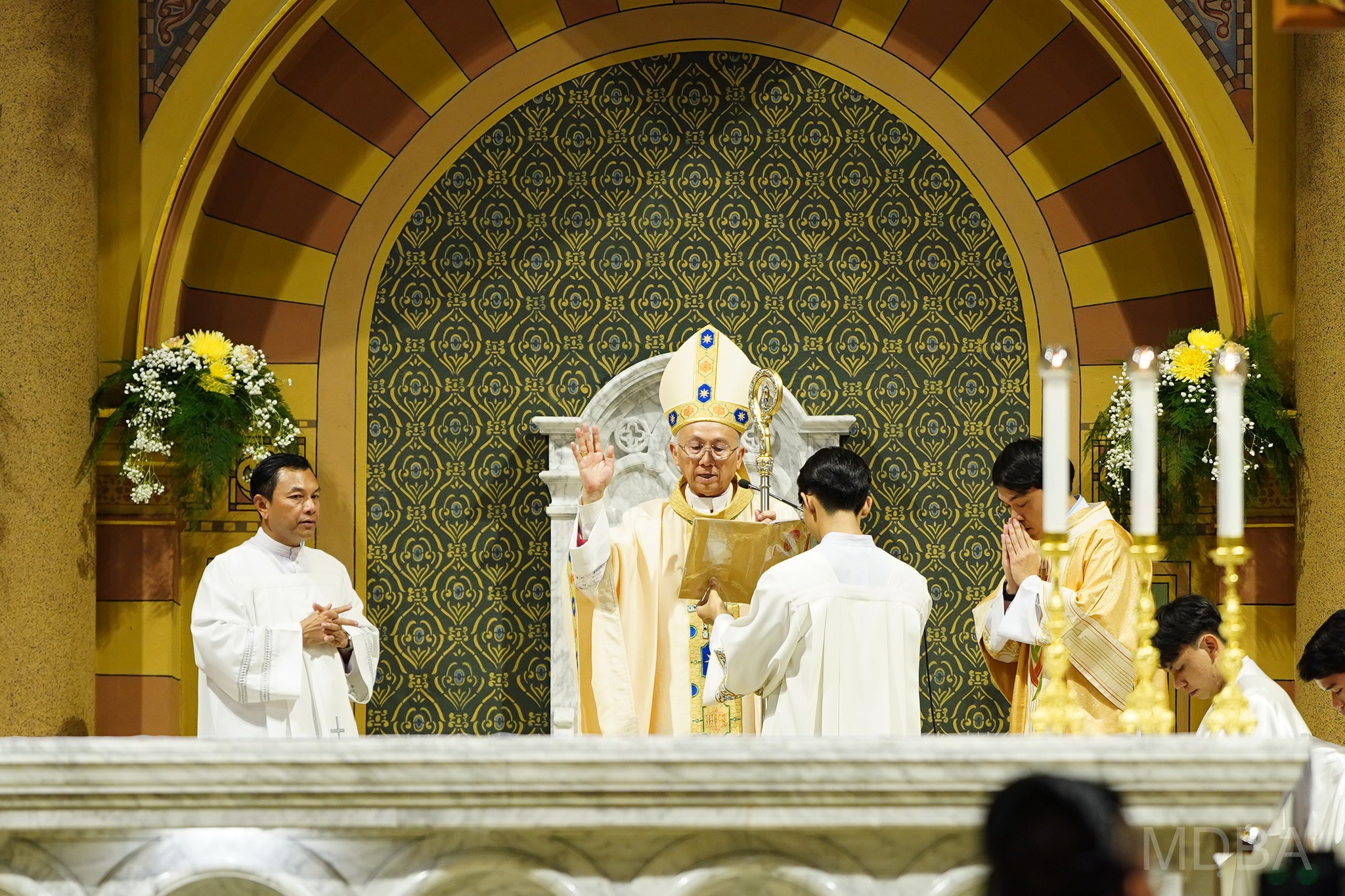เจ้าชายแห่งพระศาสนจักร : การไตร่ตรองถึงศักดิ์ศรีและหน้าที่ของพระสังฆราช
- รายละเอียด
- หมวด: บทความทั่วไป
- เขียนโดย Missio Ad Gentes
- ฮิต: 100

เจ้าชายแห่งพระศาสนจักร : การไตร่ตรองถึงศักดิ์ศรีและหน้าที่ของพระสังฆราช
“พระสังฆราช คือ เจ้าชายแห่งพระศาสนจักร” เป็นความจริงอันลึกซึ้งที่สะท้อนถึงศักดิ์ศรีและความรับผิดชอบที่มาพร้อมกับตำแหน่งนี้
วันนี้ ข้าพเจ้ามีโอกาสได้เข้าร่วมพิธีเข้ารับตำแหน่งพระอัครสังฆราชของอัครสังฆมณฑลของเรา อันเป็นช่วงเวลาที่สำคัญยิ่ง ซึ่งย้ำเตือนถึงกระแสเรียกศักดิ์สิทธิ์ที่พระสังฆราชแต่ละองค์ได้รับ ในฐานะ “เจ้าชายแห่งพระศาสนจักร”
“พระสังฆราช” ไม่เพียงแต่เป็น “ผู้นำ” เท่านั้น หากแต่ยังเป็น “ผู้รับใช้” เป็น “ผู้ได้รับมอบหมาย” ให้ชี้นำทาง อีกทั้งปกป้อง และบันดาลความศักดิ์สิทธิ์แก่บรรดาสัตบุรุษในความดูแลของท่าน บทบาทมีที่มาซึ่งหยั่งรากลึกในพระคัมภีร์ ทั้งได้รับการเสริมสร้างจากคำสอนของบรรดาปิตาจารย์แห่งพระศาสนจักร และได้รับการส่องสว่างโดยองค์พระจิตเจ้าอยู่เสมอ สิ่งเหล่านี้เตือนใจให้ระลึกถึงประวัติศาสตร์อันยาวนาน และ
พระหรรษทานอันลึกล้ำที่แผ่ปกคลุมช่วงเวลาแห่งความศรัทธานี้
ในยุคแรกของพระศาสนจักร พระสังฆราชนั้นถือว่าเป็นผู้สืบทอดจากบรรดาอัครสาวก เพื่อดำเนินภารกิจที่พระคริสตเจ้าทรงมอบหมายแก่พวกเขา บทบาทนี้มาพร้อมกับภาระหน้าที่อันหนักอึ้ง ได้แก่ การสั่งสอนความเชื่อ การเสริมสร้างเอกภาพ และการนำทางมวลสัตบุรุษด้วยปรีชาญาณและความสุภาพถ่อมตน
ในฐานะเจ้าชาย พระสังฆราชมิได้ปกครองด้วยอำนาจเบ็ดเสร็จ หากแต่ปกครองด้วยหัวใจของ
นายชุมพาบาล เป็นทั้งผู้นำและผู้รับใช้ คอยดูแลให้ฝูงแกะให้ยังคงเป็นหนึ่งเดียวกันในความรักของพระคริสตเจ้า คำสอนของสภาสังคายนาวาติกัน ครั้งที่ 2 ในสังฆธรรมนูญเรื่องพระศาสนจักร (Lumen Gentium) สะท้อนความจริงข้อนี้อย่างลึกซึ้งว่า “พระสังฆราช ในฐานะเป็นผู้แทน และทูตของพระคริสตเจ้า ทำหน้าที่ปกครองพระศาสนจักรท้องถิ่นที่ได้รับมอบหมายในฐานะผู้เลี้ยงที่แท้จริง โดยได้รับความช่วยเหลือจากบรรดาพระสงฆ์ซึ่งเป็นผู้ร่วมงานของท่าน” นี่เป็นสิ่งที่เตือนเราว่า หน้าที่ของพระสังฆราชไม่ได้เป็นไปเพื่อเกียรติยศส่วนตน หากแต่เป็นการรับใช้ประชากรของพระเจ้า
นักบุญออกัสตินกล่าวไว้ว่า “พระสังฆราชคือผู้รับใช้ของผู้รับใช้ของพระเจ้า” เป็นคำกล่าวที่สรุปแก่นแท้ของกระแสเรียกของพระสังฆราชได้อย่างชัดเจน อำนาจของท่านไม่ใช่เพื่อยกย่องตนเอง แต่เพื่อประโยชน์ของพระศาสนจักร เพื่อชี้นำสัตบุรุษไปสู่ความศักดิ์สิทธิ์ และมีความสัมพันธ์อันลึกซึ้งกับพระเจ้า
องค์พระเยซูคริสตเจ้าทรงสอนเราในพระวรสารตามคำบอกเล่าของนักบุญยอห์น บทที่ 10 ข้อที่ 11 ว่า “เราเป็นผู้เลี้ยงแกะที่ดี ผู้เลี้ยงแกะย่อมสละชีวิตเพื่อแกะของตน”
พระสังฆราชถูกเรียกให้ดำเนินรอยตามพระฉบับแบบขององค์พระคริสตเจ้า ด้วยความรัก และความเสียสละ พร้อมที่จะอุทิศชีวิตเพื่อประชากรที่ได้รับมอบหมายให้ดูแล ดังนั้น บทบาทของพระสังฆราช จึงมิใช่เพียงแต่ด้านการบริหาร หากแต่ยังลึกซึ้งในแง่ของการดูแลจิตวิญญาณ ท่านต้องคอยดูแลสัตบุรุษ ด้วยพระวาจาของพระเจ้าและศีลศักดิ์สิทธิ์ ทั้งคอยปกป้องพวกเขาจากความผิดพลาดและความแตกแยก
พิธีเข้ารับตำแหน่งพระอัครสังฆราชองค์ใหม่ เป็นสัญลักษณ์ที่เห็นได้ชัดถึงความต่อเนื่องของพันธกิจแห่งอัครสาวก ทั้งยืนยันถึงความไว้วางใจอันลึกซึ้งที่พระศาสนจักรมอบให้แก่พระสังฆราช ในฐานะพยานชีวิตแห่งความเชื่อ และผู้นำที่ได้รับเรียกให้นำพาสังฆมณฑลไปสู่ความศักดิ์สิทธิ์ ขณะที่เราร่วมเป็นสักขีพยานในพิธีกรรมศักดิ์สิทธิ์นี้ ขอให้ระลึกถึงข้อความของท่านนักบุญเปโตร ที่เตือนบรรดาพระสังฆราชว่า “จงเลี้ยงดู
ฝูงแกะของพระเจ้าที่อยู่ในความดูแลของท่าน จงดูแลด้วยความเต็มใจตามพระประสงค์ของพระเจ้า มิใช่ดูแลด้วยความจำใจ จงดูแลด้วยความสมัครใจ มิใช่ดูแลเพราะเห็นแก่อามิสสินจ้าง” (1 เปโตร 5:2)
ขอให้ช่วงเวลาแห่งการรับมอบตำแหน่งพระสังฆราชนี้ เป็นโอกาสให้สัตบุรุษได้รื้อฟื้นพันธสัญญาของตนที่มีกับพระศาสนจักร ผ่านการภาวนาเพื่อพระสังฆราช จะได้มีปรีชาญาณและพละกำลังในการปฏิบัติหน้าที่ และระลึกเสมอว่าภายใต้การนำของท่าน พระศาสนจักรจะก้าวเข้าไปใกล้ชิดกับดวงพระหฤทัยของพระคริสตเจ้ามากยิ่งขึ้น
ขอให้อัครสังฆมณฑลของเรา เจริญรุ่งเรืองโดยการอภิบาลของพระอัครสังฆราชองค์ใหม่ ทั้งขอให้ทุกคนได้ร่วมกันเข้ามาสู่ความรัก ความเป็นหนึ่งเดียว และความศักดิ์สิทธิ์ที่องค์พระเยซูคริสตเจ้าทรงปรารถนา
ในให้บังเกิดขึ้นในพระศาสนจักรของพระองค์
- - - - - - - - - - - - - - - - - - - - - - - - - - - - - - - - - - - - - - - - - - - - - - - - - - - - - - - - - - - - - - - - - - - - - - - - - - - - - - - - - - - - - - - - - - -
"The Prince of the Church: Reflecting on the Dignity and Duty of the Bishop"
------
"The bishop is the prince of the Church," a profound truth that highlights the dignity and responsibility entrusted to the office of the bishop. Today, I have the opportunity to attend the Installation of the local ordinary in our Archdiocese, a moment that serves as a powerful reminder of the sacred calling that each bishop receives. As the prince of the Church, the bishop is not only a leader but a servant, one who is called to guide, protect, and sanctify the faithful entrusted to his care. His role, deeply rooted in Scripture, enriched by the teachings of the Church Fathers, and constantly illuminated by the Holy Spirit, reminds us of the rich history and profound grace that surrounds this moment.
In the early Church, bishops were recognized as successors of the apostles, continuing the mission that Christ Himself entrusted to them. This apostolic role carries with it the weight of teaching the faith, fostering unity, and guiding the faithful with wisdom and humility. The bishop, as a prince, does not rule with dominion but with a pastoral heart. He serves as both shepherd and servant, ensuring the flock remains united in the love of Christ. The Second Vatican Council’s words in Lumen Gentium resonate deeply here: “The bishops, as vicars and ambassadors of Christ, govern the particular Churches entrusted to them, as true pastors, with the assistance of the priests, their co-workers.” This reminds us that the bishop's role is not one of personal glory but of service to the people of God.
In the words of St. Augustine, "The bishop is the servant of the servants of God." These words encapsulate the essence of a bishop’s vocation. His authority is not for self-exaltation but for the well-being of the Church, for guiding the faithful toward holiness and communion with God. As Jesus Himself taught us in John 10:11, “I am the good shepherd; the good shepherd lays down his life for the sheep.” The bishop is called to follow this model of self-sacrificial love, always ready to lay down his life for the people he is called to serve. The bishop's role is not merely administrative but deeply spiritual, ensuring the faithful are nourished by the Word of God and the Sacraments and are protected from error and division.
The installation of a new bishop is a tangible sign of the continuity of apostolic ministry. It affirms the deep trust that the Church places in the bishop as a living witness to the faith, a leader called to guide the diocese in its journey toward holiness. As we witness this sacred event today, we are reminded of the words of St. Peter, who exhorts the bishops to “tend the flock of God that is in your charge, not by constraint but willingly, as God would have you do it, not for shameful gain but eagerly” (1 Peter 5:2). May this moment of installation be a time for the faithful to renew their commitment to the Church, to pray for the wisdom and strength of the bishop, and to remember that through his leadership, the Church grows ever closer to the heart of Christ. May the diocese flourish under his pastoral care, and may all be drawn deeper into the love, unity, and holiness that Christ desires for His Church.



